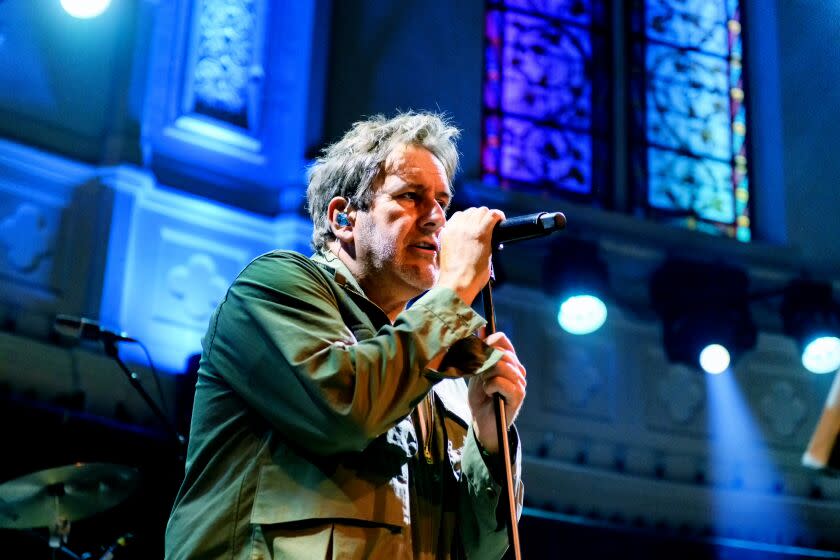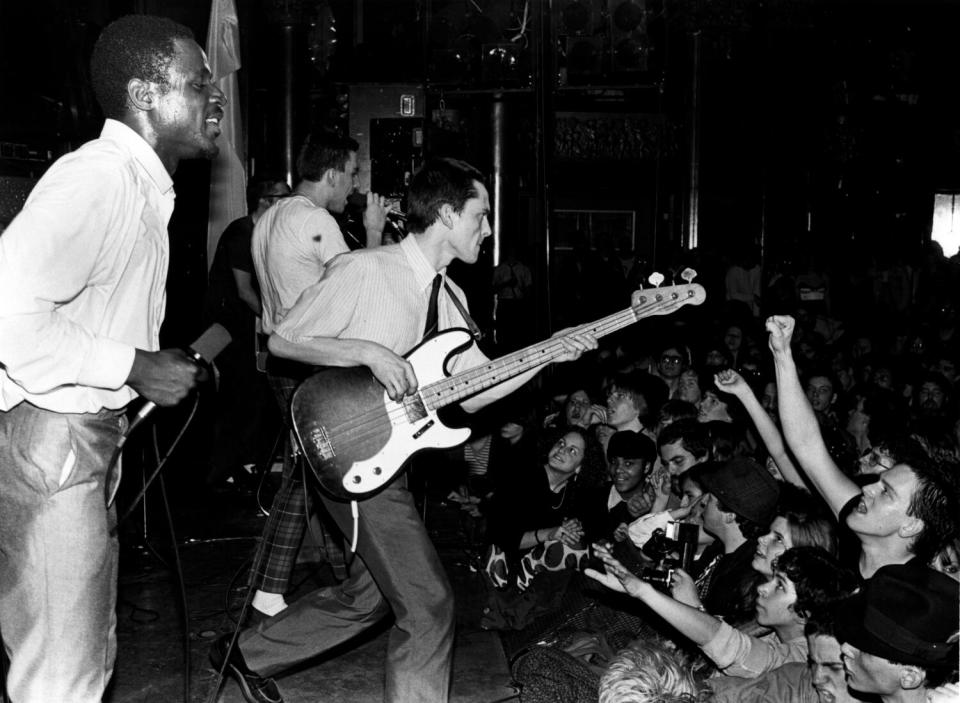Terry Hall, frontman for English ska-punk band the Specials, dies at 63

- Oops!Something went wrong.Please try again later.
- Oops!Something went wrong.Please try again later.
- Oops!Something went wrong.Please try again later.
- Oops!Something went wrong.Please try again later.
Terry Hall, who fronted the groundbreaking British ska-punk band the Specials and went on to a noteworthy career in his other bands and as a songwriter and collaborator, died on Dec. 18. He was 63.
On Monday, the Specials announced his death on social media, noting that Hall died “following a brief illness” and hailing him as “one of the most brilliant singers, songwriters, and lyricists this country has ever produced.”
His bandmate, Horace Panter, wrote on Facebook that Hall died from pancreatic cancer.
Hall brought to the raucous band a deadpan style of singing and a skeptical mien that was sometimes described as dour. He wasn’t a florid singer, but anything he sang felt true, especially songs about hard times and tough choices. “Hall knew proletarian life from inside,” critic Simon Reynolds wrote, but “was too piercingly intelligent not to see right through its treadmills and traps.”
At the peak of their abilities, the Specials released only two albums, "The Specials," produced by Elvis Costello, in 1979 and "More Specials" in 1980. But their music and their message both caused tremors in England. “Our government leaders aren’t interested in knowing the way people feel,” Hall said in 1981, and Specials songs, often written by keyboardist Jerry Dammers, were like telegrams from a dole queue, giving voice to frustration and horror.

The multiracial, seven-member Specials often performed for antiracist and other progressive causes and wanted to function as an example of harmony and inclusiveness. Their debut LP followed by less than six months the start of Margaret Thatcher’s long reign as prime minister and formed a one-sided dialogue with her severe, anti-immigrant, Conservative policies.
England was in the midst of very un-British turmoil, largely due to a bad economy. The Specials, and the movement they inspired and led, wanted to unite minorities and mass support for policies that would help England’s unemployed youth. Their music functioned as a kind of shadow ministry to the early days of Thatcherism, and they had six consecutive Top 10 singles on the British charts. In America, they performed “Gangsters” and “Too Much Too Young” on “Saturday Night Live” (Neville Staple brought a Tommy gun onstage) and toured as an opening act for the Police.
Fittingly, the Specials took one final, definitive shot at Thatcher before they walked off the pitch: “Ghost Town,” a haunted ballad of post-industrial despair that ruled as a No. 1 single for three weeks in England. It both predicted and described the raucous protests that engulfed the country in 1981, a reaction to an economic recession as well as new powers Thatcher had granted to the police, who applied the law disproportionately to Blacks and Asians.
The Specials were heavily influenced by ska, the lively Jamaican dance music of the 1960s, and Dammers used his success to start the record label Two Tone, which released music from other successful ska-rock bands, the Selecter, Madness and the English Beat. Since then, new ska revivals appear regularly, most successfully with the popular Orange County band No Doubt, who covered the first Specials single, “Gangsters,” with Hall as a guest. They also made Hall a guest star in their video for “Sunday Morning” and returned the favor with walk-on appearances in his 1997 video “Ballad of a Landlord.”
The protest singer Billy Bragg paid homage to Hall on Twitter, writing, “The Specials were a celebration of how British culture was envigorated [sic] by Caribbean immigration but the onstage demenour [sic] of their lead singer was a reminder that they were in the serious business of challenging our perception of who we were in the late 1970s.”
Terence Edward Hall was born March 19, 1959, in Coventry, England, to parents who both worked in factories. Coventry was a manufacturing hub, but the city’s most famous landmark was the Coventry Cathedral, a church that was bombed to ruins during World War II.
“I was born in the late ‘50s, so the war was still present, really,” Hall said in a 2021 interview. “The amount of bomb sites, growing up as a kid, it was all over.”
Hall was a bright kid and a skilled soccer player, but his parents waved off an opportunity to try out for a pro soccer club and to attend college, both of which cost money they didn’t have.
When he was 12, Hall said, he was sexually abused by a schoolteacher and other pedophiles during a trip to France. He told no one for years, including his parents. “Me dad was a heavy drinker. They had their own lives, you know?” he explained. By 13, he’d developed a Valium addiction. He took short-term work in Coventry, including stints as a bricklayer and an apprentice hairdresser.
Shortly after seeing the nascent Sex Pistols in concert, Hall took up singing. After being in a punk band called Squad, he joined the Coventry Automatics, a group formed by Dammers and some friends from art school, and after personnel changes, that band became the Specials.
The first song Hall wrote for the group, “Man at C&A,” appeared on their second album. He also inadvertently co-wrote the Go-Go’s hit “Our Lips Are Sealed.” Hall met the group at the Whiskey in L.A. and began a romance with guitarist Jane Wiedlin. Hall wrote her letters, which Wiedlin said were full of “tragic” teenage feelings. He also sent her some song lyrics, which she used to write “Our Lips Are Sealed,” and it became the Go-Go’s first single for I.R.S. Records, reaching No. 20 in America.
Hall also recorded “Our Lips Are Sealed” in the Fun Boy Three, a sardonically named trio he formed with Specials mates Staple and Lynval Golding. The group had seven singles in the U.K. Top 20, including “Really Saying Something,” a 1982 collaboration with girl-group Bananarama, which got substantial play in U.S. dance clubs. Meanwhile, Dammers and a few other Specials associates continued on as Special AKA.
Maintaining a pattern, Hall made only two albums with his next group, the Colourfield, continuing his gift for bouncy songs with a maudlin undertone. Their biggest hit, “Thinking of You,” reached No. 12 in the U.K.
The remainder of Hall’s music career sometimes felt random. He formed the retro-pop band Terry, Blair & Anouchka, collaborated with Dave Stewart of Eurythmics under the moniker Vegas, and worked with the Lightning Seeds, Gorillaz, Toots & the Maytals, Lily Allen and Tricky. He released solo singles and albums, starting with "Home" in 1994; it included “Forever J,” a love song about his first wife, Jeanette Hall, a childhood sweetheart.
The renown of the Specials only grew with the years. The music magazine Q rated their debut the 38th greatest British album of all time, and Pitchfork placed it in the top half of a list of the 100 best albums of the 1970s. Mojo featured "More Specials" on a list of the 80 best albums of the 1980s, and it’s been cited as an influence on Blur and Amy Winehouse, as well as trip-hop groups Massive Attack and Portishead.
There were, inevitably, Specials reunions, including a world tour and two albums, but Hall sat them out. He developed a drug addiction and a dependency on alcohol to regulate his mood.
In 2004, Hall tried to commit suicide. In the aftermath, he was diagnosed with bipolar disorder and also got back in touch with his former bandmates. “All I wanted to do was rekindle our friendships,” he later said.

The Specials toured in 2009 to celebrate their 30th anniversary, with Hall though without Dammers, who claimed he’d been forced out of the band. Lineup changes continued, and stalwart drummer John Bradbury died in 2015. The group’s 2019 album, "Encore," debuted at No. 1 on the U.K. album chart, marking their first chart-topper since 1980. They followed it with "Protest Songs 1924-2012," a wide-ranging covers album with songs by Leonard Cohen, Frank Zappa and Bob Marley.
The Specials had planned to record a new album in Jamaica and tour, but COVID lockdown scotched their activity. “I spent the time trying to figure out how not to die,” he said. They did play in 2021 and 2022, including Hall’s last show, headlining a festival in the north of England on Aug. 21.
Hall’s survivors include sons Felix and Leo from his marriage to Hall, and a son Orson, from his second marriage, to Lindy Heymann, a British TV and movie director.
Hall had a durable sense of humor both about his personal struggles and his melancholy taste in music. “I like the idea of finding like-minded people and having a bit of a moan,” he told an interviewer last year.
This story originally appeared in Los Angeles Times.

